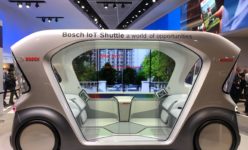In February, the Technical University of Munich surprised with a statement that already a 30% share of electric cars could cause bottlenecks in the power supply in Germany. The fear was that the German power grid was not prepared for a potential boom of electric cars.
The scientists at the Technical University of Munich refer to a forecast by management consultants Oliver Wyman. This predicts that the proportion of electric cars in Germany could rise to up to 30% by 2035. It is assumed that in suburban areas the 30 percent quota could already be reached in five to ten years. And that’s really a problem.
Thereupon I recalculated the figures in an interview with Prof. Murza, Chair of the Department of Thermal Energy Systems at the Augsburg University of Applied Sciences. Our results differ significantly from those of the TU Munich scientists, because we already have more than enough electricity for electric cars. The energy suppliers could easily guarantee the power supply even with a theoretical share of 100% of electric cars.
Let us sharpen the pencil: If we assume a typically driven 20,000 kilometres of annual vehicle output in our country, with an average consumption of an electric car of 15 kWh per 100 km we calculate the total electricity requirement of an electric car to 3,000 kWh per year. This corresponds approximately to the annual consumption of a typical, smaller single-family house in Germany.
Let us assume that Chancellor Angela Merkel’s target of 1 million electric cars has been reached by 2020. The annual consumption of these 1 million vehicles would then be three (3!) terawatt hours. The total annual consumption of electricity in Germany is currently around 620 terawatt hours. We therefore speak of a requirement of 0.5 percent of our annual electricity production for the admittedly more desired than attainable number of 1 million electric vehicles. In this constellation, even as a layman, I really do not see a major problem for our energy supply coming our way.
What if we all drive electric cars?
But the calculation goes on. Projected to a theoretical share of 40 million electric cars, the projected share amounts to 20 percent of energy consumption in our country. If you look at the current fluctuations in the network between the week and weekend days alone, you will see that this 20 percent corresponds to the normal daily fluctuations in the network today.
But I have to protect the Munich scientists a little bit. Their concern is also based on the prediction that all electric cars will be connected to the power grid at the same time and then start charging at the same time. This is also a rather theoretical assumption, i.e. the idea that all electric drivers come out of the office in the evening and connect the vehicles to the sockets at the same time.
“So why load at 8 pm in the evening when I know that the commuter does not need the vehicle again until 7 pm the next morning.“
Here, too, I can reassure you. Already today, the digital, intelligent charging stations can help to compensate for loads. Unlike the tank nozzle for petrol or diesel vehicles, the charging station does not necessarily charge immediately but when it detects that the electricity is cheaply available or can be supplied as required. So why load at 8 pm in the evening when I know that the commuter does not need the vehicle again until 7 pm the next morning. It is therefore sufficient to load the electric trolley overnight.
Intelligent, digital systems help with the smart loading of our electric cars. And with the improved availability of charging stations in cities, communities or on private land, such as supermarket car parks or shopping centers, we will be able to make much better use of the service life of our vehicles in the future.
Post a Comment
You must be logged in to post a comment.






















